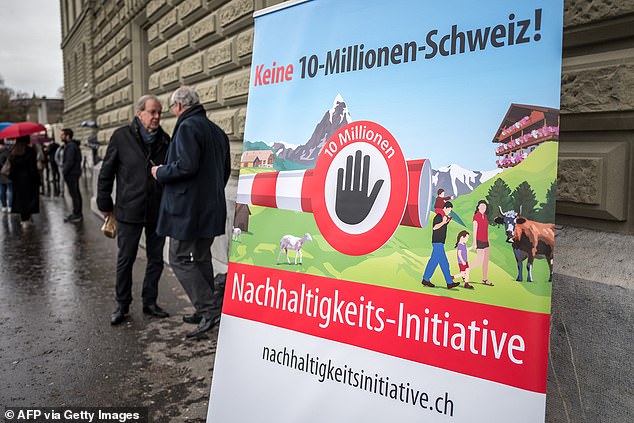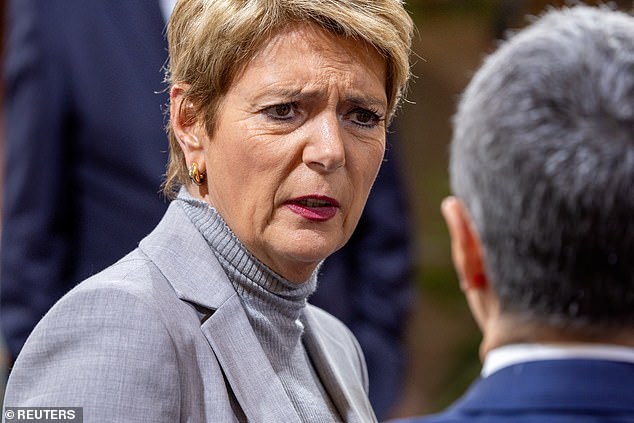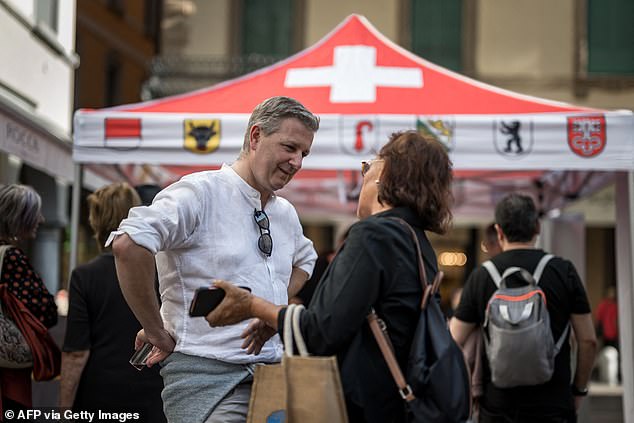Switzerland will cap its population to ten million as part of an immigration crackdown under plans put forward by the hard-right People’s Party.
The Swiss People’s Party (SVP) – which is the largest in the ruling coalition of four parties – launched the anti-immigration initiative last year, which was signed by more than 115,000 residents and could be on the ballot as soon as 2026.
The initiative demands that the population of those permanently living in Switzerland doesn’t exceed ten million before 2050 after the country first recorded nearly 9 million residents in 2023.
As soon as population numbers reach nine and a half million, the initiative demands that ‘temporarily admitted persons [foreigners] shall not receive a residence or settlement permit, Swiss citizenship or any other right of residence.’
After 2050, the initiative demands that the Federal Council sets a new immigration limit based on the excess of births.
Swiss finance minister Karin Keller-Sutter has called the SVP campaign ‘dangerous’ and a threat to businesses’ ability to attract top talent from abroad.


She said at a Bloomberg event: ‘When people talk about immigration or migration, what they mean is asylum seekers. They don’t really mean the qualified staff in hospitals, the doctors we need. We couldn’t work without them.’
The population cap won’t differentiate between workers arriving from abroad and asylum seekers, which would clash with the needs of Swiss business who are reliant on talent from abroad.
While Keller-Sutter acknowledged that it was a ‘responsibility of Swiss businesses to try to recruit Swiss people whenever possible’, Switzerland’s aging population was making this more difficult.
In 2023, about 180,000 people immigrated into Switzerland, most of them moving for work.
More than every fourth resident in Switzerland is a foreigner, which is one of the highest rates in Europe.
‘Foreigners have contributed significantly to offsetting the shortage of skilled and unskilled labor,’ the Swiss Federal Office for Migration told Bloomberg.
This was echoed by professionals like Roche Holding AG’s Chief Executive Officer Thomas Schinecker who said that people have to be hired and if they can’t be found in Switzerland, they would need to be hired from abroad.
The SVP, which has its roots as a farmers’ party in the German-speaking part of Switzerland, became a national force focused on opposition mass migration, closer ties with the European Union and any concession of Swiss independence.
The SVP comfortably topped the Swiss general elections in October 2023 and holds two of the seven seats in the power-sharing government, but it is often at odds with its three coalition partners.
The 246 parliamentarians in Switzerland choose the seven members of the government, where seats are shared out 2-2-2-1 among the four main parties.
The Federal Council government takes its decisions by consensus and collective responsibility.
The SVP, the biggest party in the lower house of parliament, has been pushing hard to restrict immigration, arguing that population growth risks becoming unmanageable. That has put pressure on the government to contain the numbers.


SVP took 29 per cent of the vote in elections to the lower house of parliament in Switzerland in October 2023.
‘We have received a very clear mandate from the Swiss population to put on the table issues which matter to them, such as illegal immigration,’ SVP president Marco Chiesa, who was visibly happy about the results, told national broadcaster RTS.
The SVP came far ahead of the left-wing Social Democrats on 18 per cent, while the centre-right party The Centre and the right-wing party called FDP.The Liberals both finished on 14 per cent – with all three chasing parties largely flatlining.
Meanwhile the Greens could not replicate their dramatic gains at the last election in 2019 and slid back four percentage points to finish fifth on nine per cent.
Switzerland, a wealthy European country of 9 million people, voted for all 200 seats in the National Council lower house of parliament and all 46 in the Council of States upper chamber.
The SVP’s election campaign focused on its favourite theme: the fight against ‘mass immigration’ and the prospect of the Swiss population reaching 10 million.
Its ‘New normal?’ social media adverts, spotlighting crimes perpetrated by foreigners, plunged into a world of bloodied knives, hooded criminals, fists, bruised faces and frightened women.
‘The situation in Switzerland is serious: we have mass immigration, we have big problems with people seeking asylum. The security situation is no longer the same as before,’ Thomas Aeschi, head of the SVP parliamentary group, said.
‘There are many people in Switzerland who fear the situation will get worse.’
The SVP has topped every National Council election since 1999.

